India has thousands of Central & State laws some of which were passed during the British era. While many obsolete & archaic laws were repealed in recent years, some still exist in the statute books. Here is a summary of a few such irrelevant acts.
The Indian Aircraft Act, 1934 categorizes balloons and kites as aircrafts thereby making negligible flying an offence. Such ludicrously outdated laws continue to exist in Indian Law Books.
There are numerous laws, both central and state laws, existent in India which date back to the 1800s and the colonial-era despite India becoming an Independent nation in 1947. Such archaic laws which are obsolete, redundant, repetitive, and irrelevant to the current times, make the legal process long, expensive, and time-consuming. Not just the common public, even lawyers and law enforcement agencies may be unaware of these obsolete laws sometimes.
Various committees have been constituted to recommend repeal of obsolete laws
Since independence, multiple committees have made recommendations to repeal unnecessary & obsolete laws, and also suggested modifications to certain laws so as to meet the requirements of the present. The Law Commission of India came up with recommendations for repealing archaic laws in 1957, 1984, 1993, and the latest one in 2014.
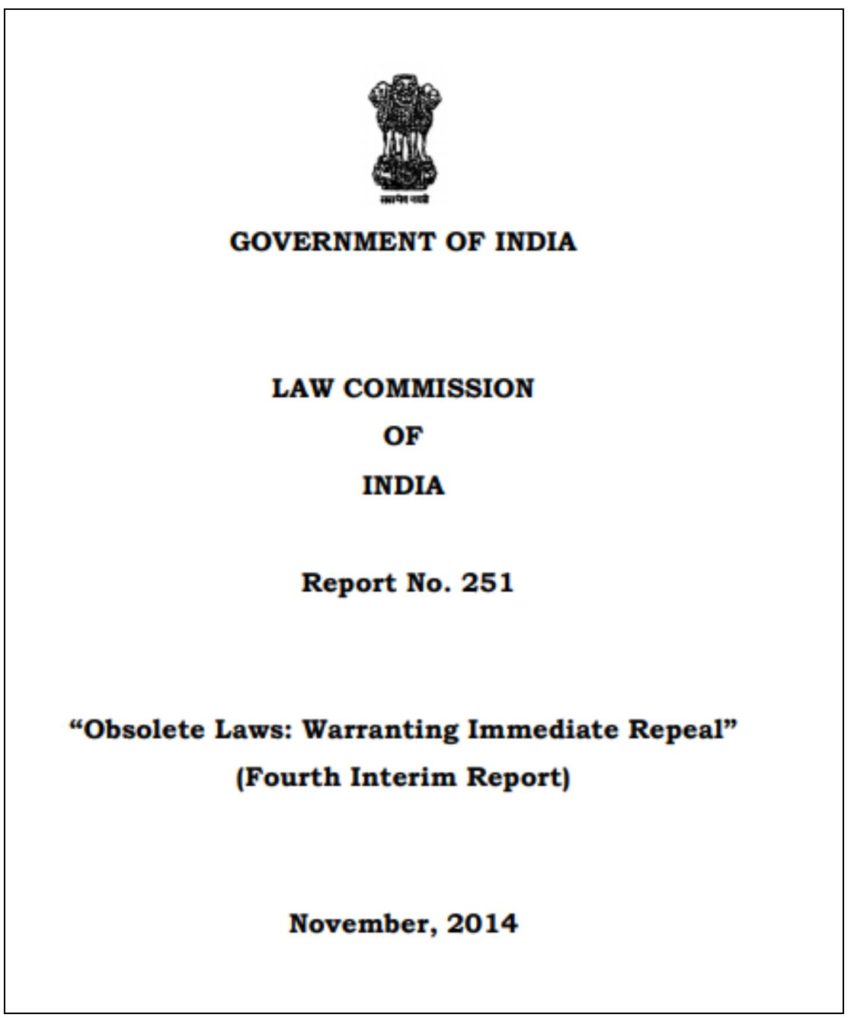
Besides the Law Commission, in 1998, a committee under the chairmanship of PC Jain was constituted by the Department of Administrative Reforms and Public Grievances to make recommendations for repeal or amendment of laws. The Commission suggested the repeal of over 1300 Central laws alone, out of around 2500 such laws. Later in 2014, the Prime Minister’s Office set up a two members committee to identify Central Acts to be repealed or re-enacted since they are no longer necessary or relevant in the present socio-economic context. This committee listed a total of 1741 Central Acts for repeal out of 2781 Central Acts existing as of 15 October 2014.
Repeal of obsolete laws was a part of BJP’s 2014 election manifesto
Elimination of whatever was obsolete in laws, regulations, administrative structures, and to reduce and simplify obsolete and multiple laws as part of the Bharatiya Janata Party’s election manifesto in the 2014 general elections. According to PIB in January 2021, ‘successive governments could remove just 1,301 obsolete laws which came in the way of smooth administration in 66 years, the present central government has managed to weed out as many as 1,500 laws in six years’.
Some of the laws that have been repealed over the years are-
- Dramatic Performances Control Act, 1876 was passed as a measure to curb theatrical representation in India. It gave power to the government to prohibit any theatrical performance if it found the performance to be against it. Further powers to conduct arbitrary search and seizure procedures, control of an area, etc. were part of the law. The draconian law was repealed in 2018.
- The Bangalore Marriages Validating Act, 1936 was passed solely for recognizing certain marriages solemnized by missionary Walter James Mc. Donald Redwood who did so under the belief that he was duly authorized to do it. Since the purpose of the law was met, it was also repealed in 2018.
- The Ganges Tolls Act, 1867 was enacted to levy tolls on steamers and boats that plied on the river Ganges for defraying the expenses of improving and facilitating the navigation of the Ganges between the then Allahabad and Dinapore. Meanwhile, the National Waterway (Allahabad-Haldia Stretch of the Ganga-Bhagirathi Hooghly River) Act, 1982 was enacted, to levy toll in the same region and for the same purpose, thereby raising the possibility of double taxation. Hence, the Ganges Tolls Act was repealed in 2018.
- Salt Cess Act, 1953 was repealed in 2016. The Act was passed for levying tax on salt in order to meet the expenses incurred on salt organization maintained by the government. However, over the years, it was observed that the cost of collecting the cess alone was more than the cess collected.
Nonetheless, there are still a myriad of laws that need to be either repealed or re-enacted after modifying. We look at few such archaic laws, the context behind passing the same, and why it is irrelevant in the current context.
Sonthal Parganas Act is discriminatory
The Sonthal Parganas Act, 1855 removes the operation of general laws and regulations in certain districts where the Sonthal tribe inmates inhabit. The act came into force after the Sonthal rebellion against the British colonial authority and the Zamindari system. The Preamble of the Act refers to Sonthals as an ‘uncivilized race of people’ as the reason behind removing the operation of generals laws in the areas inhabited by Sonthal tribe members. This is discriminatory in nature and contrary to the spirit of the Constitution and hence must be repealed.
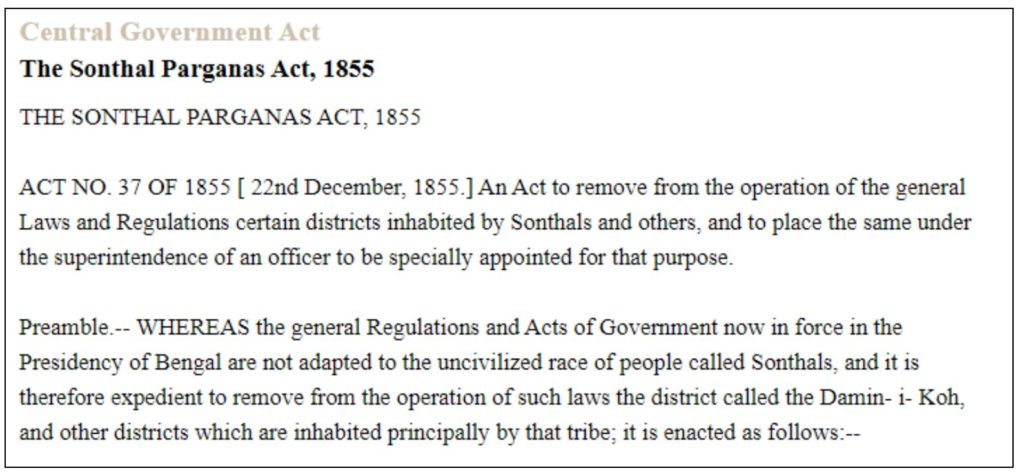
Indian Treasure Trove Act may be misused
The Indian Treasure Trove Act, 1878 defines ‘treasure’ specifically as “anything of any value hidden in the soil” and worth as little as 10 rupees. The law entails that the finder of any such treasure, according to this law, needs to inform the Collector of the “nature and amount or approximate value of such treasure and the place where it was found.” Prior to 1937, the law stated that a share of the treasure or the money in lieu of it, for concealing the information or abetting offense, would go to ‘Her Majesty’.
However, the punishment involved is imprisonment for a year and/or penalty. Also, the low value of treasure mentioned, Rs. 10, may be used to harass farmers and other economically deprived persons. Thus, the law may be modified to meet the current requirements.

Telegraph services stopped in India in 2013 while committee has recommended combining the laws in 2014
The Telegraph Wire (Unlawful Possession) Act, 1950 was enacted for regulating the possession of telegraph wires of specified dimensions. The sole purpose of the Act was to ensure that wires of the specified dimensions are not used for other purposes and to control theft. However, the Act in the present times in spite of the Ramanujan Committee report’s recommendation to combine this Act and the Indian Wireless Telegraphy Act, 1933 that regulates the possession of the apparatus makes no sense as the telegraph services in India were completely shut down in 2013.
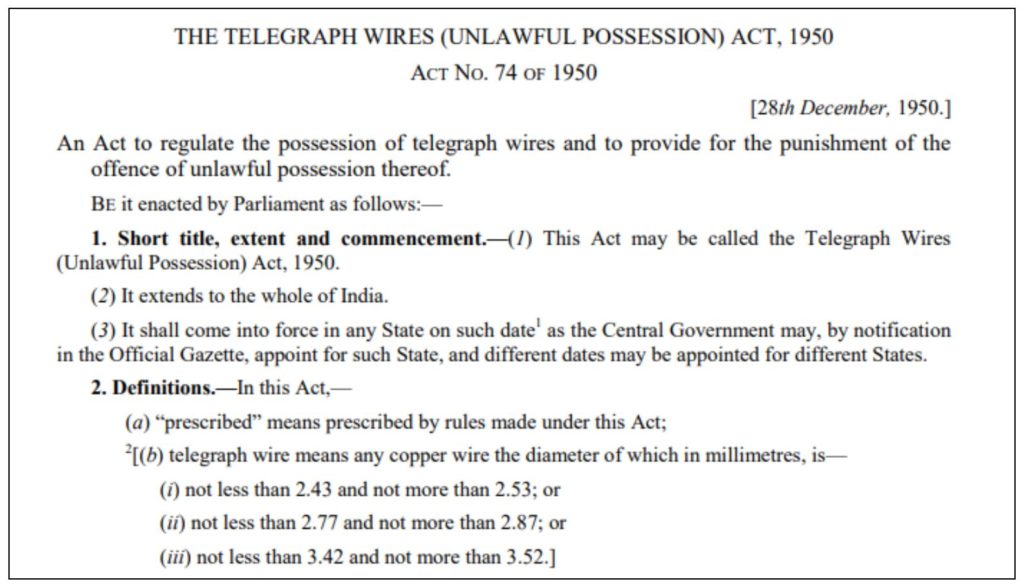
Involvement of private sector in public services should be considered
The Government Buildings Act, 1899 exempt the buildings and lands owned or in possession of the Government in municipality limits from adhering to the municipal building laws. However, with the exception of buildings connected with defence or confidential/secret buildings of the government, a notice of the proposed work should be submitted to the municipal authority before starting the work. Municipal authority or authorized person has the power to inspect the land and building. Though the PC Jain Commission recommended the repeal of the act by state governments, the Law Commission report has suggested modifications for re-enacting the act in the current socio-economic context. For instance, government services are being carried out in PPP mode or through outsourcing to the private sector. This should also be considered in the legal statute.
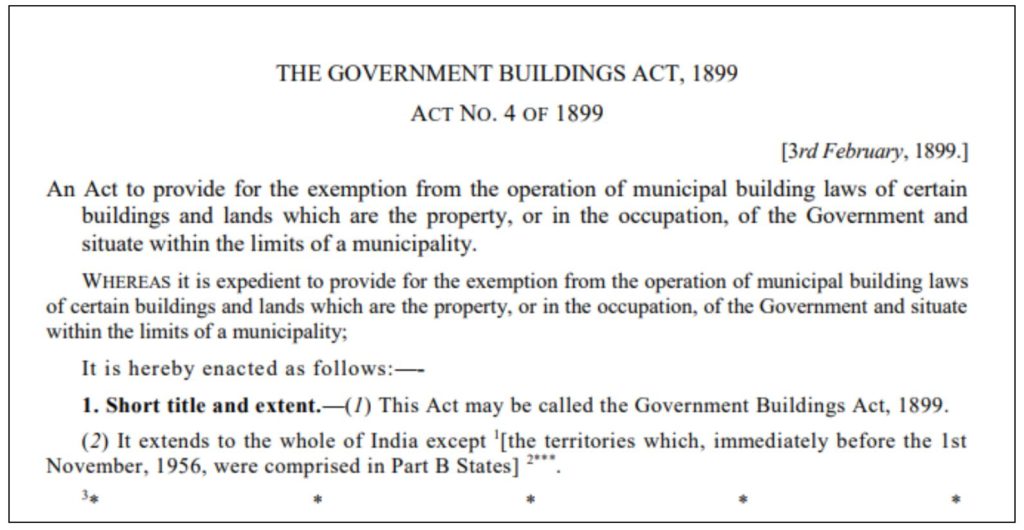
Comprehensive act is necessary to deal with pandemics
Epidemic Diseases Act, 1897 is a 124-year-old legislation that was enacted by the British to deal with the plague epidemic that had significantly affected Bombay. The Central Government is conferred with the power to take measures in the case of an outbreak of epidemic diseases such as inspection of ships or vessels entering or leaving Indian ports. Disobeying the law results in imprisonment for one month and a fine of up to Rs. 200. This Act was recently invoked in India in 2020 during the COVID-19 outbreak which revealed the lacunae in the legislation. To summarize, nothing has been mentioned with respect to the magnitude or severity of the disease, possible spread, international travel, dissemination of vaccines or drugs, and more. It only speaks of the government’s power. The P.C. Jain Commission recommended its repeal whereas the Law Commission felt that it needs to be re-enacted in view of today’s socio-economic context.
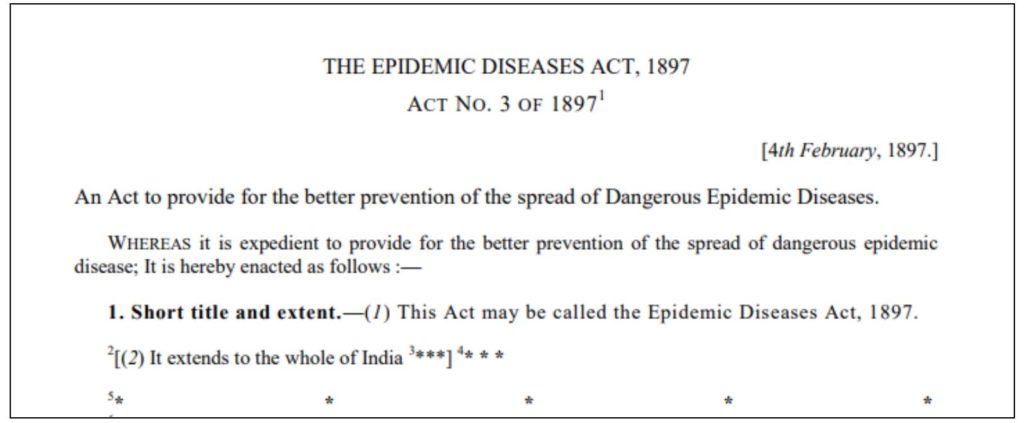
Overall, it is seen that some of these archaic laws are redundant, outdated, and even discriminatory in nature as they were made in the pre-independence era. Regular review of laws is necessary as was done in the last few years. However, this must become a periodic affair.
Featured Image: Archaic Laws in India


